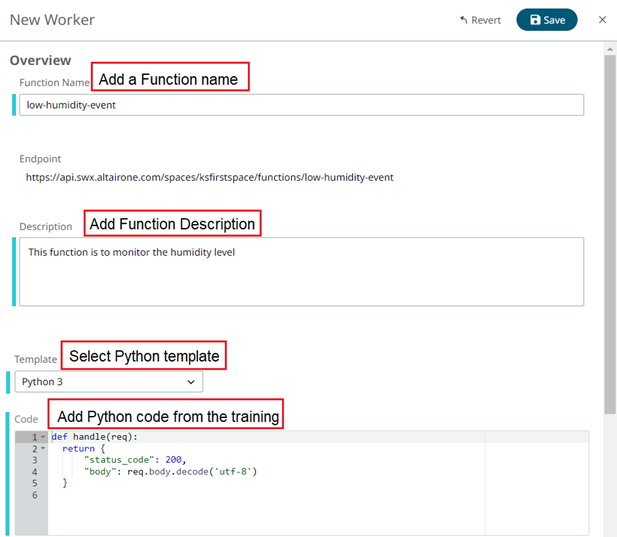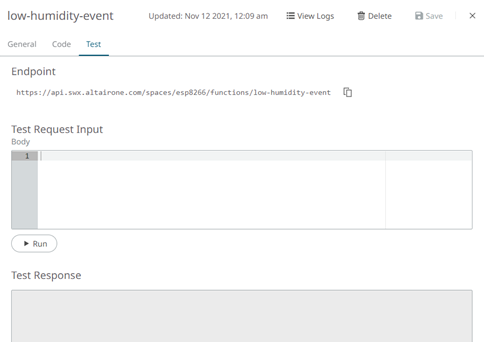Create a Function to Automate the Process
Functions provide the capability to execute the custom business rules.
For example, one of the NodeMCU property’s is "humidity", capturing the humidity level. We want to monitor the humidity level and if it drops below certain level then send an email notification.
- To create a function, click Functions > Workers.
- Click New Worker.
- Add the Function name as count-blink.
-
Select the Python 3 template.

Figure 1. -
Enter the following code. In the provided code, add your
thing’s Client ID and Secret ID from the Interface tab inside the Thing. Also,
complete the PATH with your own values.
import time import requests import json API_HOST = 'https://api.swx.altairone.com' PATH = "/spaces/Enter_your_space_name/collections/ Enter_your_collection_name /things/ Enter_your_thing_id /properties/ Enter_your_property_name" CLIENT_ID = "Add your client ID from Interface tab inside the Thing" CLIENT_SECRET = "Add your client Secret from Interface tab inside the Thing" def get_access_token(): payload = f'grant_type=client_credentials&' \ f'client_id={CLIENT_ID}&' \ f'client_secret={CLIENT_SECRET}&' \ f'scope=thing.read thing.update' headers = {'Content-Type': 'application/x-www-form-urlencoded'} response = requests.request("POST", API_HOST + "/oauth2/token", headers=headers, data=payload) return response.json()['access_token'] def revoke_token(token): payload = f'token={token}&' \ f'client_id={CLIENT_ID}&' \ f'client_secret={CLIENT_SECRET}' headers = {'Content-Type': 'application/x-www-form-urlencoded'} response = requests.request("POST", API_HOST + "/oauth2/revoke", headers=headers, data=payload) return response def handle(req): body = req.body.decode("utf-8") body = json.loads(body) cpu = body['cpu'] token=get_access_token() if cpu >= 85: state = "Critical usage" elif 50 < cpu < 85: state = "Normal usage" else: state = "Low usage" headers = {"Authorization": "Bearer " + token} response = requests.request("PUT", API_HOST + PATH, headers=headers, json={"statecpu": state}) revoke_token(token) return { "body": response.json(), "status_code": response.status_code } -
Add an Event trigger as follows:
status/your-space_name/collections/your_collections_name/things/your_thing_id/properties/humidityWhen using this method, the function will be invoked whenever there is a change on the Property
humidityon the Thing you have created. -
Deploy your function by clicking Save.
The function is created. This could take a few minutes. The status of your Function will be updated to a Building status and, eventually, it will become Running. At this point, your Function is ready to be called.
-
You can edit the code in the Code tab as necessary.

Figure 2.